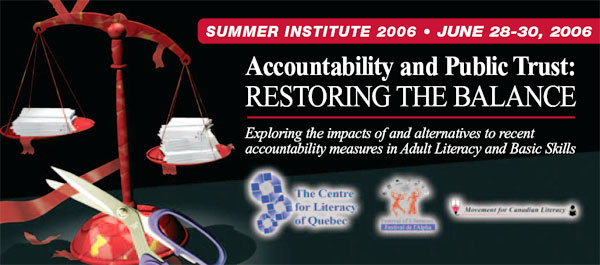Summer Institute 2006: Accountability and Public Trust - Restoring the Balance
THE CONTEXT
A November 2005 submission to the Canadian sponsorship inquiry endorsed by The Voluntary Sector Forumission highlighted the problems faced by the voluntary sector because of current accountability practices by governments which seem to emphasize inputs and controls rather than results. The submission asserts that current accoountability frameworks focus too much on avoiding risk and results in “micro-scrutiny disproportionate to the dollars involved”. The authors call for federal accountability structures that better balance the need for fiscal control and risk management with the need to measure results.
Meanwhile the adult literacy field has been consolidating its efforts to create a ten-year plan of action with measurable outcomes. The time is right to examine the impact of the accountability issue on this field, and to consider how the recommendations from the Voluntary Sector Forum and other alternatives might re-channel our energies toward achieving long-term outcomes.
In the 2002 BBC Reith Lecture series, Dr. Onora O’Neill, a philosopher and Principal of Newnham College, Cambridge, traced the growth in the UK of a public culture of suspicion and distrust. She condemned “new conceptions of accountability, which superimposes managerial targets on bureaucratic process, burdening and even paralysing many of those who have to comply”. She examined and called into question the assumptions that underlie the prevailing sense of a crisis of trust, a sense shared well beyond the UK, and offered some new ways to consider the idea of public trust. Recent recommendations on re-balancing the scales of accountability take on added meaning in Dr. O’Neill’s framework. We have invited Onora O’Neill to contribute to the 2006 Institute.
TO THINK ABOUT:
- How much do you trust your public institutions? How do you measure that trust?
- How much does your community trust you and your organization? How do you know?
- How have various accountability requirements affected your program or personal work life in the past ten years? Consider issues of time, energy, creativity, innovation.
- How often do you experience conflict between the accountability measures of different funders?
- Have accountability requirements ever put you in an ethical dilemma?
- How can accountability measures be made less onerous?
- What would count as "evidence" of "results"?
One component identified for effective public accountability by government is ongoing engagement with service partners. The adult literacy field had an exemplary model of engagement with government through the National Literacy Secretariat, but this has been threatened as a “common system” of accountability has been implemented. How can we sustain and share this model in a more flexible accountability framework?


